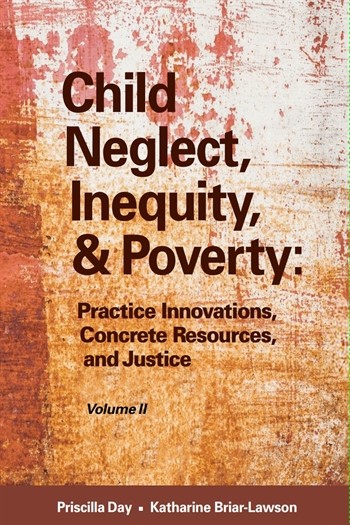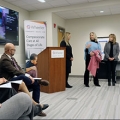Wheeler Staff Highlighted in Book on the Vital Role of Local Community Support in Child Welfare
 Dru Breslav, LCSW, senior director of community-based family services, and Elisabeth Cannata, Ph.D., vice president, community-based family services and practice innovation, are among the authors of a chapter in a new book by the Child Welfare League of America, entitled "Child Neglect, Inequity, & Poverty, Volume II: Practice Innovations, Concrete Resources, and Justice."
Dru Breslav, LCSW, senior director of community-based family services, and Elisabeth Cannata, Ph.D., vice president, community-based family services and practice innovation, are among the authors of a chapter in a new book by the Child Welfare League of America, entitled "Child Neglect, Inequity, & Poverty, Volume II: Practice Innovations, Concrete Resources, and Justice."
Their chapter discusses "Economic Insecurity and Families Involved with Child Welfare: The Pivotal Role of Local Community Support," which they wrote with Patricia Carlson, from the University of Connecticut School of Social Work, and Jenny Vesco, of the Connecticut Department of Children and Families.
An excerpt of the chapter is available below, and the book can be purchased at this link.
"There are three fundamental elements of the CSF program design that are posited as critical to its success based on staff observations and numerous testimonials from families served over the years. First is the core principle that families identify and drive the focus of the CSF intervention: They are asked about what help they need to reduce stress in the home and are recognized as the experts on their family’s needs. Although perhaps counterintuitive, the program requirement that the DCF FAR worker accompany CSF to the first meeting with the family to identify any protective service concerns or recommendations allows the family-driven service plan to take shape. The CSF worker can join with the family, listen, and provide supportive guidance. As connections to resources and the easing of burdens in the home begin to unfold, the CSF worker and the family can explore if the original risk factors from protective services have been addressed. The flexibility of the program allows each family to receive the services that they need to be successful and that will be uniquely helpful to their family system. By partnering to address challenges that the family identifies first, the engagement is solidified, and future work can explore deeper issues and barriers that families may have felt uncomfortable to initially reveal.
A second core ingredient of the program’s success is the broad knowledge base of CSF staff and connection to practical resources in the community. Parent navigators in the program have an essential role in compiling useful and reliable resources for families to access food, clothing, diapers, household items, furniture, toiletries, school items, and more. Availability of discretionary funding also helps to address the basic need challenges that may have been central to the original call to the protective service reporting hotline. By having access to funds that can rapidly be applied to reducing stress and increasing family stability and safety, the CSF worker can quickly be seen as a support rather than as a monitoring extension of protective services. At times, crises can be diverted by a quick payment to keep the utilities on in the house or to a fix to the family vehicle that is essential for work and income. Families contribute what they can; the program is able to pay the remainder to support the family and remove barriers.
Finally, while CSF staff knowledge about and access to resources reduces family stress and helps to engage parents, it is the attention to teaching, modeling, and supporting the parents’ successful navigation of systems themselves that families repeatedly identify as what “made the difference” for them. They have expressed feeling empowered by having the knowledge and skills necessary to navigate the systems around them and meet their family’s needs."





